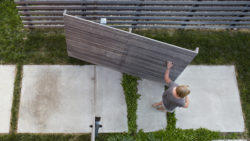ArchiTalks: Mentorship
What’s mentorship all about? A year and a half ago, I wrote a 3-part series on mentorship. Today for ArchiTalks, it’s time to take another look at the subject. Lessons learned, new goals, and more insight into growing our beloved profession. (The reality is, these tips can loosely be applied to any profession). Let’s go!
Note: This is the twenty-seventh post in a group series called #ArchiTalks started by Bob Borson of Life of an Architect. This month’s topic comes from Mike LaValley: “Mentorship”.

Mentorship: find one
The previous mentorship series focused more on the importance of mentorship, how to find one, and how to be one. I want to focus on one aspect in the “how to find a mentor” camp and it can easily be summed up in one question:
What do you want to learn?
I’ve written before about the importance of continued learning…like oodles of times. It’s the same reason you’ll find me devouring articles, books, traveling to see new things, asking questions, etc. Learning and staying on top of innovative changes is how you will stay resilient as a professional, young or old. When it comes to finding a mentor, what do you want to learn?
You can have more than one; I currently have over 8 people I would consider mentors and they all teach me something different and equally valuable. So figure out what you want to learn, do your own research, find people excelling in that field, and read what they have to say on the subject. Then ask them questions (but don’t overload them, they didn’t become a leader on a subject by lounging around). Share with them what you know and what you’re hoping to learn. Show them your game plan and your PASSION.
A person passionate about something you’re also passionate about is like gasoline on the mentorship fire. Mentors love seeing that you care.
Mentorship: be one
Find someone who will teach you something. Learn it. Find someone who wants to learn something. Help them learn it.
1. Know how to say “No.”
Your time is valuable and you didn’t become mentor quality by doing nothing all day. At the same time, it is not in the best interest of you or your mentee to overload yourself just because you feel like you have to take them on. Their passion will be infectious. But stay true to your needs so that you can best help them AND you. If you’re already having a hard time juggling, maybe have a frank conversation with the mentee about timing and keep in touch. Chances are you know someone else who’s equally awesome who could help in the meantime.
2. Be open and honest.
Even about your failures. Especially about them.
Be accessible to the people wanting to learn from you and you will find that you learn, too. Share your missteps and what you learned in the process. This isn’t a contest; you’re trying to help someone grow.
3. Be Accountable
This person has come to you to learn. Be accountable to yourself to help them do so, and hold them accountable to succeed. Your mentee is a reflection of yourself: help them be awesome, just like you hopefully are.
This requires action, which is why you hopefully took number 1 to heart. You’re going to have to spend time and invest in this person. No one likes a person full of hot air, all talk and no action. So buckle down and show your mentee how professionals rock their goals.
3. Have fun
Learning is fun!
And if you’re still being a grouch, imitation is the sincerest form of flattery. But that shouldn’t be why you’re a mentor.
So have fun teaching and sharing what you know. You don’t have to do this in a classroom setting. It can be over cocktails, lunch, dinner, a coffee break, a walk in the park, etc.
Everyone wins when mentorship is working.
Enjoy learning. Enjoy teaching. Be sure to check in with yourself regularly to see how you might need to course-correct to achieve your goals, or how you might help others with your newfound knowledge. Don’t hoard it like Scrooge McDuck and his vault of gold coins. Together we can keep making this profession and the world better.
That’s why you mentor.
To see the take on “Mentorship” from other Architects, follow the links to the others in the #ArchiTalks group who are posting today on the theme:
- Bob Borson – Life of an Architect (@bobborson) “This is NOT Mentorship”
- Marica McKeel – Studio MM (@ArchitectMM) “ArchiTalks: Mentorship”
- Eric Faulkner – Rock Talk (@Wishingrockhome) “Bad Mentor, Good Mentor”
- Brian Paletz – The Emerging Architect (@bpaletz) “I’ve got a lot to learn”
- Nisha Kandiah – ArchiDragon (@ArchiDragon) “Mentorship : mend or end ?”
- Mark Stephens – Mark Stephens Architects (@architectmark) “Mentorship”
- Jeffrey Pelletier – Board & Vellum (@boardandvellum) “Mentoring with Anecdotes vs. Creating a Culture of Trust”
- Samantha R. Markham – The Aspiring Architect (TheAspiringArch) “Why every Aspiring Architect needs SCARs”
- Jeff Echols – Architect of the Internet (Jeff_Echols) “Mentors, Millennials and the Boomer Cliff”
- Emily Grandstaff-Rice – EGRFAIA (@egrfaia) “Gurus, Swamis, and Other Architectural Guides”
- Drew Paul Bell – Drew Paul Bell (@DrewPaulBell) “Advice From My Mentor”
- Keith Palma – Architect’s Trace (@cogitatedesign) “Mentor5hip is…”
- Gabriela Baierle-Atwood – GBA (@gabrielabaierle) “On Mentorship”
- Mark LePage – EntreArchitect (@EntreArchitect) “Influence”
- Jeremiah Russell – ROGUE architecture (@rogue_architect) “teach them the way they should go: #architalks”
- Stephen Ramos – Buildings Are Cool (@sramos_BAC) “The Top 3 Benefits for Architects to Mentor and to be Mentored”
- Jarod Hall – di’velept (@divelept) “The Lonely Mentor”
- James Mehaffey – Yeoman Architect (@jamesmehaffey) “My Mentor”
- Timothy Ung – Journey of an Architect (@timothy_ung) “5 Mentors that are in my life”
- Ilaria Marani – Creative Aptitude (@creaptitude) “Mentorship”





